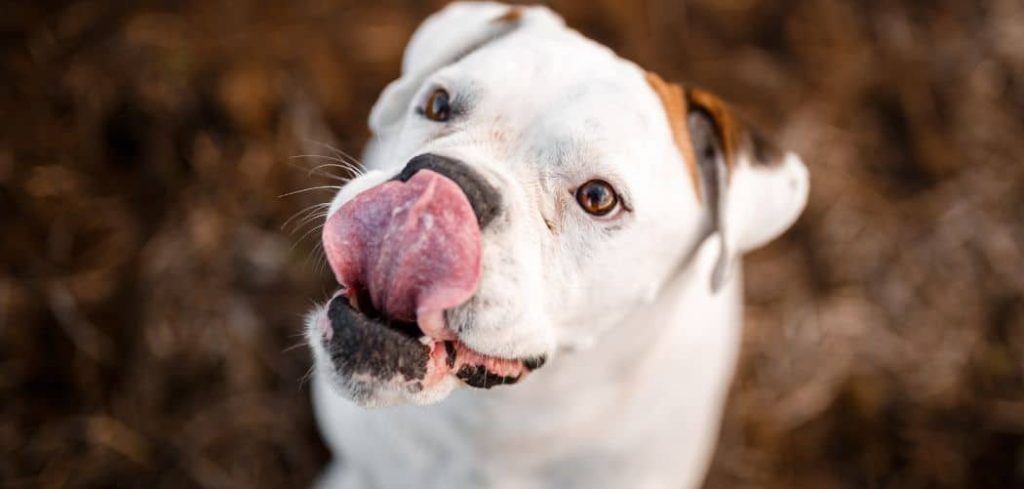When your dog is panting heavily and has noticeably bad breath, it’s more than just an unpleasant smell — it can be a sign of an underlying health issue.
Panting can indicate stress, pain, or respiratory strain, while foul breath may point to dental disease, metabolic problems, or internal illness.
We outline the common reasons why dog panting and bad breath occur, what you can do at home, and when to seek veterinary help.
Dog Panting and Bad Breath — Why It Happens
Dog panting and bad breath is often a sign that your dog is uncomfortable or unwell. Dental infections, heat stress, heart disease, respiratory problems, and metabolic disorders like kidney or liver disease can all trigger these symptoms together.
Pain, anxiety, and certain toxins can also contribute to changes in breathing and oral odor.
Sometimes the cause is as simple as advanced tartar buildup, but other times it signals a serious, even life-threatening, medical condition.

Common Causes of Dog Panting and Bad Breath
Dental Disease
Dental disease is one of the most common reasons dogs develop bad breath, and severe cases can lead to panting due to pain. Plaque and tartar buildup harbor bacteria that produce foul-smelling compounds.
As gum disease progresses, teeth can loosen, abscesses may form, and your dog may breathe faster due to oral discomfort.
Owners may notice reddened gums, drooling, dropping food while eating, or visible yellow-brown tartar.
Left untreated, oral bacteria can spread to the bloodstream, potentially damaging the heart, liver, and kidneys.
Read more: Dog Panting and Back Legs Shaking (Here’s why)
Heatstroke
When a dog overheats, heavy panting is the body’s primary cooling mechanism.
In the process, you may notice an intensification of bad breath because saliva production changes, and any existing oral odor becomes more concentrated.
Heatstroke is life-threatening and can develop quickly in hot weather or after intense exercise.
Other signs include bright red gums, lethargy, vomiting, and collapse.
Immediate cooling and urgent veterinary care are essential.
Heart Disease
Heart problems can cause panting due to fluid buildup in the lungs or poor oxygen circulation.
Bad breath may occur when reduced circulation affects oral tissue health or when secondary fluid retention creates an ammonia-like odor.
You might also notice coughing, weakness, and decreased tolerance for exercise.
Heart disease in dogs requires prompt diagnosis and ongoing medical management to prevent heart failure.
Respiratory Infections
Infections of the nose, throat, or lungs can make breathing harder, leading to panting.
At the same time, mouth breathing can dry the oral cavity, intensifying any existing bad odor.
Symptoms may include nasal discharge, coughing, loss of appetite, or fever.
Severe respiratory infections can quickly compromise oxygen intake, making this a medical urgency.
Kidney Disease
Kidney problems often cause a distinctive ammonia or urine-like smell on a dog’s breath due to toxin buildup in the bloodstream.
These same toxins can make your dog feel unwell, leading to increased panting from nausea, discomfort, or anemia.
Additional signs may include weight loss, increased thirst, and more frequent urination.
Advanced kidney disease can be life-threatening without veterinary intervention.
Liver Disease
The liver helps filter toxins, and when it isn’t functioning properly, a dog’s breath may take on a musty or sweet odor.
Panting can occur due to discomfort, abdominal swelling, or metabolic changes.
Look for yellowing of the eyes or gums, vomiting, diarrhea, and lethargy.
Liver disease can progress rapidly, and some causes, like toxin ingestion, require immediate treatment.
What to Do If Your Dog Is Panting and Has Bad Breath
If your dog’s bad breath is mild and their panting seems normal after exercise or heat exposure, let them rest in a cool, calm place and ensure fresh water is available.
Good oral hygiene, including regular tooth brushing and dental chews, can help manage minor odor from plaque.
If the symptoms are new, worsening, or combined with changes in appetite, energy, or gum color, schedule a veterinary check-up.
Avoid giving human toothpaste, mints, or mouthwash, as these can be toxic to dogs.
Keep your dog’s environment cool in warm weather and prevent overexertion.
Provide a balanced diet, and avoid feeding bones or hard treats that could damage teeth.
Most importantly, monitor your pet closely for any additional symptoms that may point to a more serious underlying cause.
When to Call or Visit Your Vet
Seek immediate veterinary attention if your dog’s panting is rapid, labored, or occurs at rest.
Bad breath accompanied by bleeding gums, facial swelling, or drooling can signal severe dental infection.
Go to the vet right away if your dog shows signs of heatstroke, such as bright red gums, collapse, or vomiting, or if their breath suddenly smells strongly of ammonia or has a sweet, musty odor.
Other red flags include coughing, weight loss, yellowing of the eyes, or reduced appetite.
These could indicate heart, kidney, or liver disease that needs prompt medical evaluation.
Read more: Dog Panting and Barking at Me (Here’s Why)
Key Takeaway
Panting and bad breath in dogs should never be dismissed as normal quirks, especially if they appear suddenly or worsen over time.
While some causes are minor, others can be signs of serious systemic illness.
Keeping up with dental care, monitoring for changes in breathing, and seeking timely veterinary advice will help ensure your dog stays comfortable and healthy.
Trust your instincts — if something feels off, it’s always worth getting your pet checked.
